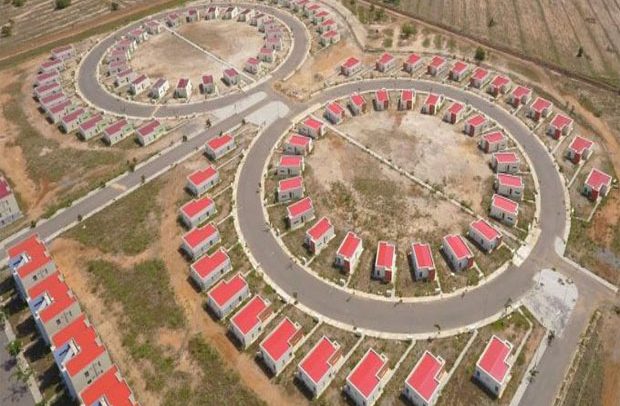Economist, Professor Godfred Bokpin, says the government’s intention of handing over the Saglemi housing project to a private developer only goes to prove that the country is not serious about inclusivity and social progression.
According to him, it has become clear that the government uses these so-called pro-poor housing projects to self-serve at the expense of the poor Ghanaians in whose name the projects are conceived.
He noted that successive governments have failed to show any commitment whatsoever in addressing issues that affect the poor “because from the conceptualisation and the pricing mechanism, it is above the means of the poor.
“So it’s almost clear that these houses are going to the middle class and the upper middle class themselves. So we only use the poor as a face shield to hide our real intention to enhance our own agenda. When you put all these things together you see a country that is just not serious about inclusivity and social progression,” he said on JoyNews’ Newsfile, Saturday.
His comment follows the Works and Housing Minister, Francis Asenso-Boakye's justification of government’s decision to sell the 1,506 units Saglemi Housing project.
He stated that an amount of about US$46 million is needed to provide water, electricity, and storm drains, funds the country cannot raise at this current moment.
According to the Minister, the units built by the NDC government in 2012 were inhabitable, hence the reason for selling the project to a private sector developer.
Prof. Bokpin stated that for a country that does not have enough revenue to sink 200 million dollars in a project and then abandon it simply demonstrates a country that is not serious, “it typifies a country that doesn’t appreciate that resources are scarce and that those scarce resources have alternative uses, and that the extent to which you maximise the alternative uses of scarce resources, that’s what makes the difference between the rich and the poor.”
“So if you spend close to 200 million dollars over these years, you’re not turning it around, then it means that you’re not being efficient at using your limited or scarce resources for the benefit of the common good,” he said.
Latest Stories
-
Ablekuma West MP Counsels BECE candidates
3 minutes -
Horizons-China, SIL partners with V/R Minister to tackle menstrual hygiene
4 minutes -
I started doing 3D drawing at age 11 – 16-year-old CEO reveals
12 minutes -
Harvey Weinstein guilty of sexual assault after New York retrial
13 minutes -
Menscook isn’t exclusively for the elite – Manager
16 minutes -
It’ll not be all men forever – Menscook manager hints
53 minutes -
Former GIIF officials seek bail variation in Skytrain case
54 minutes -
Menscook started with just 7 boys – Manager reveals
55 minutes -
ASEC slams gov’t, oil marketers over postponed fuel levy
1 hour -
Mahama does what he says he’ll do – Pianim
1 hour -
19-year-old robber jailed 20 years
1 hour -
Ibee Melody sparks regional buzz with ‘Kakalika’
2 hours -
Defence Minister justifies release of Army Generals
2 hours -
Empower local businesses to consolidate Cedi gains – AGI urges as members cut prices
2 hours -
Opoku Sanaa wins TGMA Instrumentalist of The Year 2025
2 hours

